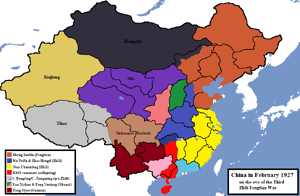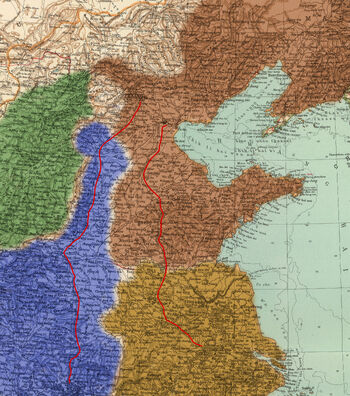- This article is designated a work in progress. Please ask the wiki team before adding content.
The Third Zhili-Fengtian War, also known as the Third Zhifeng War, was a conflict fought in early 1927 between the Fengtian Clique of northeast China and the Zhili Clique of eastern China. It began as an attempt by Zhang Zuolin of the former to capture Nanjing and monopolize his control over China's main cities. He was decisively defeated, losing Beijing and Tianjin to the Zhili who received German assistance. In return for this aid, Wu Peifu restored the Xuantong Emperor to the throne of China.
Background[]

China in February 1927, on the eve of the Third Zhili-Fengtian War
In early 1927, the Kuomintang's Northern Expedition, had been defeated, but the manner in which it happened disappointed Zhang Zuolin. He had planned to intervene and defeat the KMT at the eleventh hour to be seen as China's savior, but German intervention prevented him from having any major role in the conflict. However, this left him with the advantage of a well rested and supplied army, ensuring he could go on the offensive.
An unprovoked offensive war would nonetheless be politically disadvantageous. Zhang had spent years stoking regionalist sentiment in Manchuria, making his massive expenditures south of the wall difficult to justify. Furthermore, as a former bandit, he would have no legitimacy should he proclaim himself a national leader. In order to gain it, Zhang had to present himself as a negotiator first and a soldier second.
For this end, Zhang called for a new round of "national reconstruction" conferences, making it known that he wanted to unite China first and foremost, and proposed the drafting of a new constitution. He also ordered his subordinate, Zhang Zongchang, to move his base from Shandong to into Sun Chuanfang’s territory, ostensibly to assist in rounding up the KMT remnants. The real intent was to create a political powder-keg.
Fighting begins[]
It is unknown what exactly triggered the conflict, with some saying Zhang Zongchang began shooting during a drinking game, others that he drove a tank through a mansion wall. Whatever the case, a small war had broken out within a week of “72-Cannon Zhang” arriving at Nanjing.
Trying to present himself as a negotiator, Zhang Zuolin offered a series of deliberately unreasonable terms under which he would rein in his subordinate. When, as intended, they were rejected, Zuolin launched a full attack against Sun Chuanfang. The Fengtian Second army, supported by divisions from Manchuria, rolled down the Jinpu Line connecting Tianjin to Pukou (a district of Shanghai) and besieged Nanjing. Though Sun was not caught unaware, he was forced to fight on two fronts.
Zhang already controlled Beijing and Tianjin, and capturing Nanjing and nearby Shanghai would place four of the country’s five great cities under his control. All that Zhang would then need to ensure his reunification of China would be the tri-city area of Wuhan, held by the isolated and overstretched Wu Peifu. Zhang was confidant taking it would be easy once Sun had been defeated.
Course of the conflict[]

Jinpu and Jinhan lines, East and West respectively
Like most, Zhang Zuolin considered Wu Peifu a spent force. The Jade Martial had never recovered from his defeat in the Second-Zhili Fengtian War, and only held the Northern Expedition at Wuchang at great cost. The obvious course for anyone in his position would be consolidating control over his possessions rather than trying to expand.
Along the Jinghan Line, running from Beijing to Wuhan, Wu Peifu's forces were spread thin particularly in the north. Relying on Yan Xishan, warlord of Shanxi, to alert him to any suspicious activity along the railway, Zhang Zuolin had similarly few guarding the final stretch to Beijing.
It was thus a huge shock when a force under the Jade Marshal's command arrived at Zhuozhou, only 37 miles from Beijing. The city quickly surrendered, and by the end of the next day, Wu reached Beijing. The ancient city's walls can withstand a modern artillery barrage, and Wu could not afford a long siege. Fengtian troops could quickly have been dispatched from Tianjin, as well as from Zhangyuan (Kalgan). With these two forces combined, Wu would be crushed as the limited capacity of the Jinghan Line meant most of his troops had yet to arrive.
Wu therefore launched an assault on three of Beijing’s great gates before dawn the day after his arrival, counting on the reduced city garrison being unable to effectively man the whole length of the city walls. Before the day's end, Wu blew his way through the gate's thick wooden doors and took the city.

The capture of Beijing, Wu in black and Zhang in white
Nonetheless, in keeping with standard warlord practice, Zhang had left a considerable reserve near Tianjin which advanced north towards Beijing, while, as Wu expected, forces around Zhangyuan moved south.
The trains shuttling the Fengtian forces from Tianjin to Beijing were stopped at Lanfang by the German garrison there. The boxer protocol had granted such powers to them and other foreign troops, to ensuring that open access was maintained between the two cities, for the protection of the Legations in Beijing.
The German troops insisted that the Fengtian forces submit to a lengthy inspection process under which they had to proceed one car at a time through the station. Though the Japanese diplomatic mission in Tian protested, as they had put all their hope on the Fengtian forces to finally defeat the Zhili Clique, they had very little moral ground to stand on, as the Japanese garrison in Manchuria had halted the forces of Guo Songling only a year or so before, and were ignored by the other Great Powers.
As a result, Wu crushed the northern troops in time for him to turn his full attention south before the Tianjin force arrived. In a battle outside Beijing, the Jade Marshal's tactical genius brought him decisive victory. Backed by reinforcements from Hubei, Wu advanced to and took Tianjin, severing the Jinpu line and cutting off the Fengtian troops in Nanjing from Manchuria. Isolated and threatened from the rear, Zhang Zongchang broke his siege of Nanjing and retreated. His subsequent counteroffensive near Lutai was defeated, and the war settled into a stalemate in the Shanhai Pass.
A month later, a truce was signed with the supervision of the German and Japanese governments. Both feared war becoming a great financial drain should it escalate further, while Japan also worried the Zhili would conquer the now isolated Shandong should the fighting drag on. At the same time, Sun Chuanfang still had to deal with the remains of the Kuomintang, meaning further overextension of the Zhili forces, already spread thin, could threaten their control of southern China.
Aftermath[]

China in April 1927, on the day of the Xuantong Restoration
In return for Germany halting the Fengtian forces at Lanfang, payments to keep Yan Xishan from revealing his movement, promised material aid after capturing Beijing, and eventual recognition as China’s sole legitimate government, Wu Peifu had agreed to several concessions. German leadership generally saw China's problems as being derived from its lack of a monarch; while China had done poorly as an absolute monarchy, the chaos of Republican rule turned out far worse. Dysfunction seemed to happen to most republics; the USA was in an economic depression, and the French government had been overthrown by syndicalist rebels.
Though the Jade Martial was very unhappy with any concessions to foreign powers, he was in no position to bargain. After his defeat in the Second Zhili-Fengtian War and loss of control over the central government, he had been abandoned by many of his old allies, such as Sun Chuanfang. Germany presented the only path towards being more than just a regional warlord.
Sun Chuanfang was far more willing to engage with Germany, over time agreeing to a series of increasingly exploitative deals with the German East Asia Society (later the Supervisory Board of the East Asian General Administration), ceding land in coastal ports to exclusive German economic development in return for arms and capital. In sum, Germany greatly increased its influence in China, at the expense of Japan.
At the same time, the Zhili Clique's significant increase in power threatened Yan Xishan's long held position of neutrality in Shanxi province. The warlord had agreed to Germany's deal of money for silence without any expectation Wu could retake Bejing. Feeling vulnerable, he became open to military cooperation with Zhang Zuolin and Japan to weaken the Zhili, which would cause the Fourth Zhili-Fengtian War the next year.
